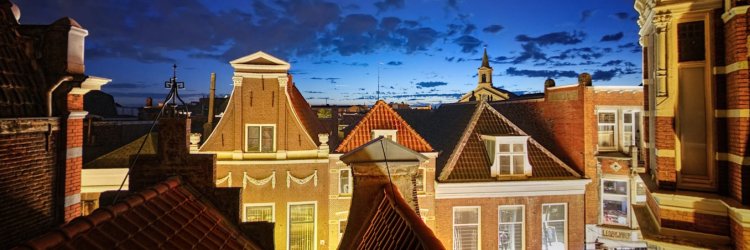
The History of the museum
Since 1988, the Corrie ten Boom Museum has been an 'open home' where visitors are guided by volunteers who tell the history of the Ten Boom family. Built around 1600 by the bailiff of Haarlem, the house has a long history. The Ten Boom family is well integrated into that history.
The ten boom family
In 1837, Willem ten Boom opened a watch shop in this house. He lived with his family in the rooms above the shop. The home was later passed down to Willem's son Casper, and then to Casper's daughter, Corrie.
The Ten Boom family were devoted Christians who dedicated their lives in service to God and their fellow man. Through the years the Ten Booms were active in social work in Haarlem. Their faith inspired them to serve the religious community and society at large. In the 1920s and '30s, the Ten Boom family took in many foster children, whose parents were doing missionary work.
a hiding place during the second world war
During the Second World War, the Ten Boom home became a refuge, a hiding place, for fugitives and those hunted by the Nazis. By protecting these people, Casper and his daughters, Betsie and Corrie, risked their lives. This non-violent resistance against the Nazi-oppressors was the Ten Boom's way of living out their Christian faith.
During 1943 and into 1944, there were usually 5-6 people illegally living in the Ten Boom home: some of whom were Jews and others members of the Dutch underground. Additional refugees would stay with the Ten Booms for a few hours or a few days until another 'safe house' could be located for them.
Through these activities, the Ten Boom Family and their many friends and co-workers of 'the BeJe group' saved the lives of an estimated 800 Jews and other refugees.
Arrest
On February 28, 1944, the Ten Boom family was betrayed and the Sicherheitsdienst (Security Service) of the Nazis raided their home. That day, more than 30 people were arrested, among whom were father Casper and Betsie and Corrie, his two daughters that were living at home. Corrie's brother Willem, sister Nollie and nephew Peter were at the house that day and were also taken to prison.
Although the Sicherheitsdienst arrested many visitors, they could not find who they were really after. Safely hidden behind a false wall in Corrie's bedroom were two Jewish men, two Jewish women and two members of the Dutch underground. Although the house remained under guard by the Sicherheitsdienst, members of a local police resistance group were able, by cunnings means, to liberate the refugees from the 'hiding place' 47 hours later. The four Jews were taken to new 'safe houses', and three survived the war. One of the underground workers was killed during the war years, but the other survived.
prison and concentration camps
Ten days after his arrest, father Casper died in Scheveningen Prison. Betsie and Corrie also spent some time in that same prison. From there, they were transported to camp Vucht and then to the notorious Ravensbrück Concentration Camp in Germany.
Life at Ravensbrück was almost unbearable, but Betsie and Corrie spent their time sharing Jesus' love with their fellow prisoners. Many women became Christians in that terrible place becauce of Betsie and Corrie's witness to them. Betsie died at Ravensbrück (age 59) but Corrie miraculously survived.
release and spreading the message
After her release from Ravensbrück Concentration Camp (age 53) Corrie travelled all around the world to tell everyone that "there is no pit so deep that God's love is not deeper still" and that "God will give us the love to be able to forgive our enemies." In more than 30 years, Corrie visited over 60 countries to testify to God's love an to encourage people with the message that "Jesus is Victor."
On April 15th, 1983, on her 91st birthday, this remarkable woman died in Orange, California. Her legacy lives on, more than 35 years after her death.
Want to know more about the history of this remarkable family? Then check out the interactive timeline of the Ten Boom Family history!